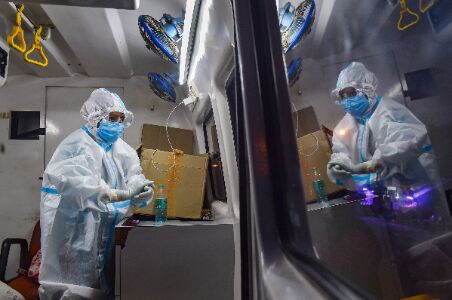Making ready

In a few short weeks, India will begin the long process of carrying out one of the most complex and vast vaccination campaigns in world history. The Government has claimed that it expects the process to last around a year from when they begin inoculation of an estimated 300 million people who have been identified as part of a priority list. After a series of meetings, the Government has created a priority list that includes healthcare workers, policemen and the elderly. Plans to conduct the vaccination drive are already underway and 1,54,000 health personnel and cold storage enough for the first 30 million doses of approved vaccines will be made available. As of now, three vaccine makers — AstraZeneca through SII, Pfizer and Bharat Biotech have applied for emergency authorisation of their vaccine candidates. While both Bharat Biotech and SII will prioritise supplying India's initial vaccine orders, many experts have noted that Pfizer will find it difficult to supply India with enough vaccines in the short term. US, UK, EU, etc., have already booked a significant portion of the limited first supply of the vaccine. Concerns have also been raised over the price of the mRNA vaccine with the US supply deal for the vaccine amounting to USD 39 dollars for a two-dose course. In comparison, the AstraZeneca vaccine to be produced in India by SII is expected to retail at Rs 1,000 per shot on India's private markets and Rs 250 (USD 3.39) under a bulk Government deal. For its part, Pfizer is aware of such pricing problems and has vowed to have a tiered pricing system that will be based on the GDP of the country in question with India falling into the mid-income tier. What exactly this will mean for the final cost of each Pfizer shot in India remains to be seen but there are other challenges to overcome. The Pfizer vaccine has a significant need for appropriate cold storage which, as many reports have noted, is a difficult task in India where such facilities are few and far in between. Still, one can expect that the company has a plan when it speaks of supplying its vaccine across the world. The Indian Health Ministry has likewise announced plans to boost cold storage options in India with both public and private players involved.
The Ministry also announced this week that it would soon be launching a new mobile app called Co-WIN which will allow citizens to self-register for the vaccination process in addition to helping the dedicated agencies track vaccine distribution. The app will also allow authorities to access all important data on co-morbidities and generally track the process of vaccination and monitor for any potential after-effects.
Meanwhile, even as India charts out the specifics of its own vaccination drive, the world watches on as vaccine developments in the 'world's pharmacy' are of great concern to many nations who are looking at India to help supply enough vaccines for the world. As the world's largest vaccine maker, India is already making frantic preparations to not only cater to the needs of its 1.3 billion citizens but also the world as a whole. As such, the Indian pharmaceutical industry is working to free-up capacity and accelerate investment even without any solid purchase orders in what they are calling a calculated risk. Foreign players have waded in too. Russia has gone so far as to make India the production and export hub for its Sputnik V vaccine. Just this week, 64 foreign envoys visited vaccine facilities in Hyderabad as a first of a series of visits that are being organised by the Ministry of External Affairs. At a time when the UN is increasingly warning of vaccine nationalism and poorer nations being left out of global vaccine changes, India's message of using its full capabilities to assist all of humanity in fighting this crisis is a significant one. More so because India has the capacity to back up such assertions. While India will naturally look to catering its own population first, there is no doubt that it will play a vital role in any meaningful global initiative to provide equitable access to vaccines for the world.



